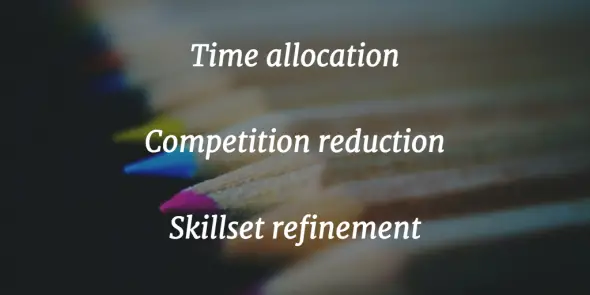Freelance writing can take you in a number of different directions. You can write journalistic articles covering news and events, write for SEO and company blogs to raise visibility or advertise products, or even work on creative projects like novels or screenplays, as part of a team.
Though all forms of writing require basic skills like fluency and attention to detail, every niche demands a different subset of specialized skills and offer different levels of compensation based on those skills (not to mention your past experience).
With that in mind, is it better for your freelance writing career to diversify writing gigs you pursue or to specialize in one key area? We’ve talked about the topic of specialization and diversification before, but let’s delve into it one more time.
The Advantages of Specialization
There are a number of advantages to specializing in one key area:
Time allocation. First, consider how you’ll be allocating your time in a diverse model. As Forever Jobless explains it, entrepreneurs who divide their time evenly among 10 different ideas will spend only 10 percent of their time on the best idea in the group, while spending 10 percent of their time on the worst idea in the group.
Wouldn’t it be more profitable if you spent 100 percent of your time on the best idea and 0 percent of your time on the worst idea? This is the concept that frames specialization; you’ll select the niche that best fits your interests and skills and spend your time doing that, rather than messing with gigs that don’t fall within your area of expertise.
Competition reduction. As a general business strategy, specialization is important as a way to reduce your competition. Writer Jonathan Buckley explains this mechanism as a way to increase your perceived value in a given area. If you specialize in legal writing, for example, you’ll appear to be a more viable candidate when applying for a legal writing job than any other generalists who apply. You may have fewer total potential jobs to apply for, but you’ll be far more valued for the ones you do.
Skillset refinement. Though the idea that 10,000 hours of practice can make you a master of anything is a myth, there’s no denying that practice invariably leads to improvement over time. The more time you spend refining your skills in one specific area, the better you’ll get at that area. If you try to spread yourself across multiple different niches and applications, you may become decent at a number of different trades, but you won’t truly master anything.
The Advantages of Generalization
However, there are also a few advantages to covering subjects and niches more generally. When you diversify writing gigs you have the following benefits:
Experimentation. As All Indie Writers explains, there are hundreds of possible specialties to choose from as a writer, and when you’re first starting out, it can be hard to choose between them. Generalizing gives you the flexibility to try out all these potential applications, so you can learn firsthand which ones interest you the most. This is especially valuable at the beginning of your career, and as a benefit, declines in value as you gain information and experience in each area.
Interest. If you find an area of specialty that you genuinely enjoy, you might remain interested in it forever—but it’s unlikely. It’s more likely that you’ll oscillate between periods of interest and boredom as you deal with the same issues and the same perks every day. Generalizing gives you more flexibility, so when you get close to burnout, you can shift gears and stimulate your interest with a new type of assignment.
Hedging your bets. Demand for different types of writing assignments ebbs and flows, just like demand in different broader industries. Generalizing is a way to hedge your bets, riding the ups and downs of multiple different areas rather than subjecting yourself to one area’s potentially catastrophic tides.
Though generalizing does have advantages for some people, overall, specialization is more profitable. At the beginning of your career, you may want to generalize so you get a feel for the demands and flow of each area, but as you grow more familiar, it’s better to settle into one path. Remember, you can always switch gears later, so try to build as much experience as you can in one niche area while you’re still pursuing it. You’ll get more jobs, make more money, and spend less time on less valuable gigs.




Leave a Reply